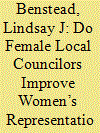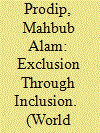| Srl | Item |
| 1 |
ID:
168847


|
|
|
|
|
| Summary/Abstract |
Tunisia’s 2018 municipal elections, in which a legislated quota was implemented and women won 47 percent of seats, raises questions about whether electing female councilors improves women’s representation in clientelistic settings. Using data from the Local Governance Performance Index (LGPI), an original survey of 3,600 Tunisians conducted in 2015 by the Program on Governance and Local Development (GLD), this article investigates the relationship between local councilors’ gender and women’s access to help with personal or community issues. Three findings emerge. First, male citizens are thirteen percentage points more likely than female citizens to know a local councilor and six percentage points more likely to have contacted a councilor for help. This offers evidence of greater network homosociality for club goods than personal requests. Second, citizens of both genders are twice as likely to contact a councilor of the same gender when asking for help with community problems. Finally, electing females increases women’s access to councilors, due to network homosociality—that is, denser personal networks with others of the same gender—but has a limited impact on men’s access because female councilors have more heterosocial networks. By showing that electing and appointing women improves service and allocation responsiveness to females, the results call attention to the need to address gender equity issues when drafting electoral laws and implementing decentralization laws.
|
|
|
|
|
|
|
|
|
|
|
|
|
|
|
|
| 2 |
ID:
182523


|
|
|
|
|
| Summary/Abstract |
This comparative case study uses qualitative data to explore and analyze the institutional obstacles that women in reserved seats face to their political empowerment in the Gram Panchayat in India and the Union Parishad in Bangladesh. The findings reveal that women in reserved seats in both countries confront some fundamental institutional barriers, such as a masculine model of politics, lack of political party support, as well as lack of power and resources. Indian women face serious problems—the inclusion of ex-officio members, the rotational system, bureaucratic dominance, and partisan elections—whereas Bangladeshi women suffer from the unequal distribution of reserved seats under a quota policy and lack of clarity in rules, power, and provisions. A lack of financial resources limits the effective participation of women members in the decision-making process in both countries. Further institutional reforms are vital to ensure women’s political empowerment through reserved seats in both countries.
|
|
|
|
|
|
|
|
|
|
|
|
|
|
|
|